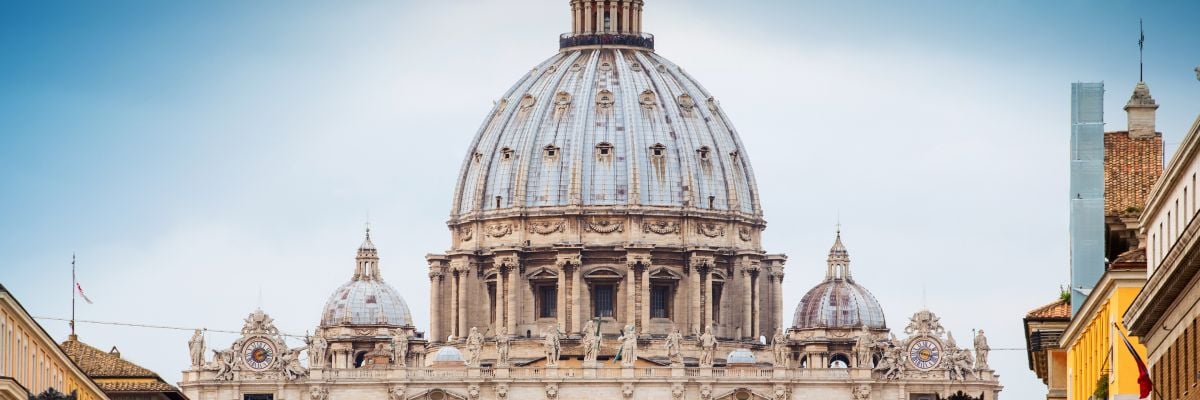
Tim Staples answers some criticisms of the legitimacy of Vatican II, such as its lack of condemned heresy or infallible doctrine, the scandal and poor liturgical practices that have followed, and its teaching that the fullness of Christianity subsists in the Catholic Church.
Transcript:
Host: We have several questions typed in there, and one from Donald I wanted to share with you and get your response. Donald writes the following: “When will Catholic Answers admit Vatican II is neither Catholic nor a council? No defined dogma, no condemned heresy, and fifty years of scandal, Modernism, and rotten fruit of scandal afterwards. Catholicism is Christianity and does not subsist in it. Protestants are not Christians because they deny the True Presence. How obvious can this be?!”
Tim: And great questions, really. I appreciate you writing those in, but a couple of misconceptions:
Number one: a council is not a valid council because it defines something infallibly. In fact, there are numerous councils, if you go back to the four Lateran–well there’s actually five Lateran Councils–but of the five Lateran Councils, only two of them defined anything infallibly. The first three Lateran Councils didn’t define anything. They were disciplinary, you know, dealing even with clerical dress and all sorts of things like that. And there were a couple of other councils that did not define anything infallibly, so that’s simply incorrect from a Catholic perspective. A council doesn’t have to define anything infallibly in order to be a council, number one.
Number two, you have to be very careful before you start saying, “Well, there’s scandals and stuff that have happened after this council, so obviously that’s a bad council.” That would eliminate just about every one of our ecumenical councils, because if you look at the history of our Catholic Church, you know, we have ebbs and flows, but we’re sinners. You know? We’re good at it. We don’t deny that there have been centuries in the Church that have been very very corrupt, even up to and including Popes that have been corrupt, and so forth, especially leading up, for example, to the Council of Trent, we have– I mean we could go to various centuries in history and there’s lots of corruption.
But see, my brother, I would point out that that’s the reason why we have the Church. The grace of the Sacraments, Jesus gave it to us. Why? Because we’re in need. We’re not, as my good friend Jesse Romero often says, you know, the Church is not a museum of saints, it’s a hospital for sinners. So you don’t want to look at “Oh my goodness, look at this scandal,” because you might end up even rejecting our Lord and Savior Jesus Christ. “Look at the scandal here! He ordained Judas!” Right? Jesus Himself ordained Judas, and look at the scandal here, and we could go down the list.
Now as, you know, as far as…what was the other point he made? The, uh…
Host: Well, Modernism, and scandal, and, well, let me look, Tim.
Tim:Yeah, I think there was one more.
Host: Somebody–oh, it got moved to the top, all right. Gimme a sec here, Tim.
Tim: Yeah, there was one other point, I think.
Host: And I cannot get to it. So it was…can you get to it Tim?
Tim: I’m gonna try. Okay, there you go. Donald, there we go. “No defined dogma, no condemned heresy, 50 years of scandal, Modernism, rotten fruit of scandal. Catholicism is Christianity and does not subsist in–” okay, that was another point.
That’s a little jab at the Council’s teaching that the fullness of Christianity subsists in the Catholic Church, and the argument is made, “Well then that means that Vatican II denies that the Catholic Church is the church that Jesus Christ established.” And that’s simply not true. The same language is used of the divine and human natures of Christ subsisting in the one person of Jesus Christ, for example, at the Council of Chalcedon in the 5th century. Are we going to say, then, “That means somehow that’s a heresy, because then you’re saying that not all of the human and divine nature of Christ subsists in the one person.” No, actually, the teaching that the the fullness of Christianity subsists in the Catholic Church is a very profound way of saying that the Catholic Church is in fact the Church that Jesus Christ established. There’s no essential change in dogma from that.
In fact, the Vatican Council reaffirmed in Lumen Gentium paragraph 14, for example, that there is no salvation outside of the Catholic Church. However, we understand that people outside of the visible boundaries of the Catholic Church–and by the way, this is nothing new to Vatican II, this was taught by Pope St. Pius IX, for example, long before Vatican II. In fact, you can go all the way back to St. Justin Martyr in the second century, and I would argue Jesus Christ as well in John 15:22, He himself talks about, concerning the Jews that were rejecting Him, He said, “If I had not spoken to them, they would have no sin; now I have spoken to them, their sin remains,” which indicates to us that you’re not responsible for that which you do not know. Jesus himself taught that. And we could go to Romans 2:14 and other examples of that as well.
But the the bottom line is, we understand that for a Protestant, or anyone outside of the visible boundaries of the Catholic Church to be saved, they must be either joined or related to the Catholic Church, because all salvation comes through Jesus Christ in his Church. There has to be a relationship, but that relationship can come in mysterious ways known to God alone, through the invincible ignorance of the person who is not responsible for for being where he is, if he’s never rejected the fullness of the truth as he knew it, then there’s that possibility of salvation. But that’s, none of that is heretical, Donald. That is simply a development from an understanding that goes all the way back to Jesus Christ.
And then as far as Protestants not being Christians because they deny the True Presence, that is simply denying the infallible teaching of our Catholic faith. In fact, the Council of Trent, we could go to, you know, the teaching of the Church perennially all the way back to the third century, this argument was had: “Whether the baptisms of heretics are valid?” That was a big argument in the third century, but it’s not any longer, all right? Pope Stephen, in the third century, and then you have, all the way forward, St. Agustine and forward, teach that as long as one has valid matter and form, as determined by the Church, a heretic’s baptism would be valid.
And Protestants in general–now there are some “Protestants,” though, I think my Protestant friends would say they’re not really Protestants, whose baptisms are questionable at times, because they’ve become so liberal. You know, like I remember reading recently, the United Church of Christ, they’ve become so liberal in denying essential teachings that you have to be careful which United Church of Christ you’re in, because some of the pastors don’t even believe, you know, possibly Jesus is God, or in the Trinity, and may not even have valid baptismal form, whereas some pastors you do. But generally speaking, Protestant baptisms are valid because they have valid matter and form, Donald, and that is an infallible teaching of the Church.
Host: Thank you very much for that question, Donald.



